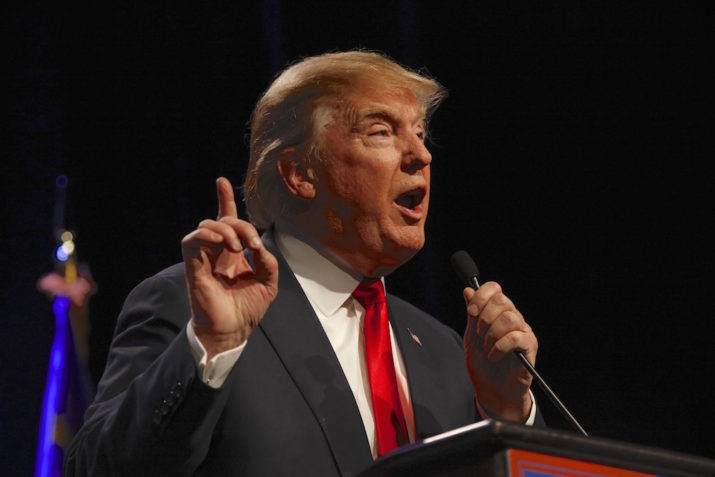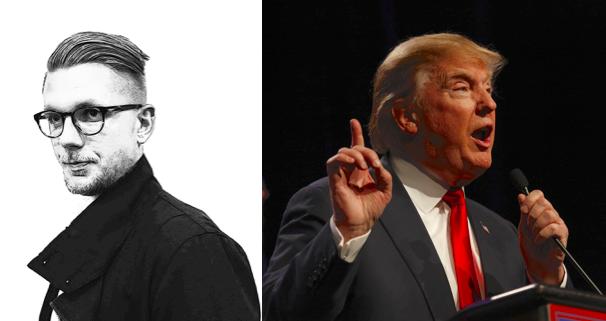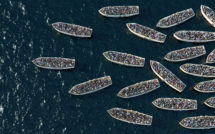

This essay is part of Morten Høi Jensen’s column European Diarist.
On January 16, Donald J. Trump, the 45th President of the United States of America, was allegedly briefed on the difference between Hezbollah and Hamas. He’d said back in September 2015 — oh, how long ago that now seems! — that he would learn the difference when it was “appropriate.” The conservative radio host Hugh Hewitt asked Trump if he could distinguish between the leaders of Islamic State, Al Nusra Front, and Hezbollah. Trump, alas, admitted that he could not. But he offered this comforting rejoinder: “I will know more about it than you know, and believe me, it won’t take me long.”
Now, we might be forgiven for thinking it was appropriate for Trump to learn these things long before he announced his decision to run for President — that, indeed, detailed knowledge of international relations, and in particular of the world’s conflict zones, is required of anyone running for the nation’s highest office. But then we’d be presuming a state of affairs that no longer exists. According to the warped logic of his political ascendance from a “bankrupt real estate monarch” (to quote Christopher Hitchens) to President of the United States, the less Trump knows about something, the more qualified he is to deal with it.
Obviously, it would take many rigorous and carefully administered lessons in world history to cover the vast and chilling tundra of President Trump’s ignorance. European history might not be a bad place to start, especially if you believe, as President Trump does, that the European Union was created in order to “beat the United States when it comes to trade,” or that it is merely “a vehicle for Germany.” A little European history might also have helped the unusually vapid statement Trump released on Holocaust Remembrance Day (in which he failed to mention Jews), or the unpleasant connotations of his “America First” slogan. In both these cases, as in others, the line between the Trump administration’s ignorance and its malice seems sinisterly blurred.
During Trump’s phone call with Angela Merkel on January 29, the German Chancellor allegedly explained the refugee policy of the Geneva Convention to the President. If only the stolid “Mutti” had gone even further and lectured Trump on the history of the European Union. She might have pointed out that the EU began as a visionary attempt to make war between Germany and France “not only unthinkable but materially impossible” (in Robert Schuman’s words); that it is a project haphazardly cobbled together over several decades and under various guises; and that it remains the imperfect but indispensable solution to a half century of unimaginable war and suffering.
Trump’s stance on the EU appears unlikely to change, however. At the time of writing (for who knows what Trump’s tomorrow might bring?), the likely candidate to serve as the US Ambassador to the EU is Ted Malloch, a former diplomat and business strategist and author of books with titles like Being Generous, Spiritual Enterprise, and Doing Virtuous Business. Recently, in a moment of Trumpian self-aggrandizement, Malloch told the BBC he had “helped bring down the Soviet Union” (perhaps by boring Gorbachev to death with a reading from his books), before nastily suggesting there might be another union out there in need of “a little taming.”
The EU is trying to “beat” the United States, ergo it must be “tamed.” This is not the language of presidents or diplomats. It’s the language of thugs. Would it be going too far to presume that it is the language of Steve Bannon, the Verkhovensky to Trump’s Stavrogin? At a private gathering in Manhattan last year, Bannon told a journalist friend of mine that Trump was “just the beginning” — a chilling remark that fits with Bannon’s alleged claim to being a “Leninist.” Speaking to the historian Ronald Rodash at a party in 2013, Bannon said: “Lenin wanted to destroy the state, and that’s my goal, too. I want to bring everything crashing down, and destroy all of today’s establishment.”
Bannon says he doesn’t remember the conversation, but in its apocalyptic nihilism it resembles Trump’s inauguration speech, which Bannon co-wrote. Europe should expect to hear more of it: Breitbart News has expanded into France and Germany, and Bannon himself has buddied up to the Le Pen family. Europe’s right-wing populists have a friend in the White House, and that friend has the President’s ear.
“The real world,” writes the Italian philosopher Maurizio Ferraris, in Manifesto of New Realism, “has certainly become a tale or, rather […] it became a reality show; but the outcome was media populism, namely, a system in which (if one has such power) one can claim to make people believe anything.”
The man who made Breitbart’s readers believe anything now holds a permanent seat on the National Security Council.
Morten Høi Jensen was born in Copenhagen, Denmark. He has contributed to the Los Angeles Review of Books, Salon, and The New Republic, and is the author of a forthcoming biography, A Difficult Death: The Life and Work of Jens Peter Jacobsen, due out from Yale University Press in the fall of 2017.
Photo: Morten Høi Jensen, Private
Photo: Donald Trump, Joseph Sohm | Shutterstock
Published on February 1, 2017.




